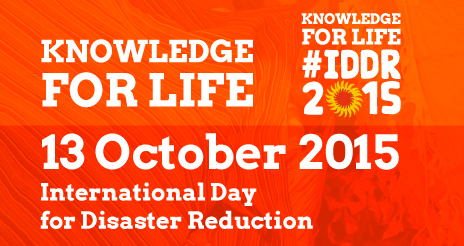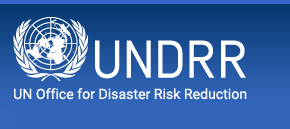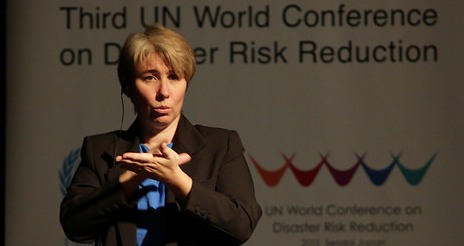- Our Mandate
- Mission and Objectives
- UNDRR in the UN
- Work Programme & Annual Reports
- Results Based System
- Work Partnerships
- Headquarters - Geneva
- SG-UN representatives for DRR
- Regional Office – The Americas and the Caribbean
- Head of the Regional Office – The Americas and the Caribbean
- What is Disaster Risk Reduction?
- What is the International Strategy?
- History of UNDRR
Sendai UN World Conference hailed for accessibility
18 March 2015, SENDAI – The Third UN World Conference on Disaster Risk Reduction (#WCDRR), is being hailed by participants as the first international meeting of its kind to provide a wide range of accessibility features for people living with disabilities.
As a result, more than 200 persons with disabilities are actively participating in the Conference proceedings as delegates, speakers, panellists, and contributors. Thirty-four events from the Official Conference Programme and Public Forum address issues of disability. The five-day Conference closes today.
Sonia Margarita Villacres of the World Federation of the Deafblind said: “I have been to many international meetings, but this is the most accessible meeting not specifically for people with disabilities.”
Japan State Minister, Mr. Ryosei Akazawa, noted that “to ensure sustainable resilience of societies it requires that persons with disabilities have access to services, infrastructure and information. The post-2015 framework on disaster risk reduction is demonstrating the feasibility to develop inclusive policies and set the tone for governments to expand their commitment to disability inclusive policies.”
At the main venues, closed captioning in English and Japanese was provided for the inter-governmental segment. In addition, sign language interpretation was provided on demand for various sessions. The venues were also made accessible with transportation available that can accommodate wheel chairs. In addition to making documents in accessible format, accessibility partner KGS Corporation provided blind participants with a machine that displayed documents in Braille.
Mr. Yohei Sasakawa, Chairman of the Nippon Foundation, a supporter of the initiative to make the Conference accessible, noted: “The Post-2015 Framework on Disaster Risk Reduction, a revised version of the current Hyogo Framework for Action, has been drafted to ensure that people with disabilities are consulted on plans and strategies for managing disaster risk following a major UNDRR global survey in 2013 which found they were often excluded and not consulted on disaster threats. It will be an important milestone and help advance the cause of disability-inclusion on other global agendas.”
Related Links
 International Day for Disaster Reduction #DIRD 2015 Knowledge for Life
International Day for Disaster Reduction #DIRD 2015 Knowledge for Life
More information

 Interpreters using sign language during the Sasakawa Awards ceremony at the World Conference on Disaster Risk Reduction in Sendai, Japan. (Photo: UNDRR)
Interpreters using sign language during the Sasakawa Awards ceremony at the World Conference on Disaster Risk Reduction in Sendai, Japan. (Photo: UNDRR)